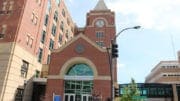By John A. Tures, Professor of Political Science, LaGrange College
As the biggest schism in the Methodism since perhaps the pre-Civil War battle over slavery ensues, Cobb County finds itself at ground zero for the debate, both in the courts and in the church. I also cover some of the debate issues that have been brought in in the battle, as my own church where I am a member in West Georgia is undergoing the same disaffiliation conflict.
Methodist churches are trying to decide whether or not to stay with the United Methodist Church or disaffiliate to join a more conservative Global Methodist group or to go independent and even abandon the Methodist title. Recently, nearly 200 United Methodist Churches sought to disaffiliate with the North Georgia Conference, and leave the UMC altogether. Their dispute included nine such churches from Cobb County, as noted in this quote from the Marietta Daily Journal.
“Nine Cobb churches were involved in the suit. According to 2022 North Georgia Conference data, the largest is Due West UMC, with 4,815 members, followed by McEachern Memorial UMC (3,592 members) and Kennesaw UMC (1,673 members). The other six churches all have memberships ranging from 50 to 500 members. They are Mountain View UMC, County Line UMC, New Beginnings UMC, Covenant UMC, St. Stephen UMC and Shiloh UMC of Kennesaw.”
The case wound up in the courtroom of Cobb Superior Court Senior Judge Stephen Schuster. “[T]he North Georgia Conference of the UMC, which governs more than 600 churches, paused the disaffiliation process, citing a need to correct misinformation,” wrote Hunter Riggall in the Marietta Daily Journal. But Judge Schuster upheld an injunction against the North Georgia Conference, allowing the possibility of disaffiliations to proceed, as reported by UM News.
As for Mt. Bethel of East Cobb, a $13.1 million settlement was reached between the United Methodists and the church, according to East Cobb News, where Mt. Bethel dropped the Methodist label to become independent over who was appointed to be the pastor of the church.
Many of the disputes in the church cover matters concerning the church’s policies on the LGBTQ community, but supporters of disaffiliation claim it’s more than that. Among the charges they cite is that the Methodist institutions like the seminaries have adopted a neo-paganistic approach (from a blog by the Institute on Religion & Democracy) citing other faiths in lessons. This argument is challenged by an extensive review of Methodist Seminaries.
“A new 86-page, independent study makes the case that each of the 13 theological schools plays a crucial role in developing Wesleyan church leaders – including the majority of United Methodist ordination candidates.” The study, done by the Rev. Daniel O. Aleshire, who is a theologian and retired Executive Director of the Association of Theological Schools in the United States and Canada, stated that his key takeaway was that the seminaries are all “deeply Wesleyan” – “At every campus I talked to, both United Methodist students and non-United Methodist students,” he said. “All of them would talk about the central Wesleyan character of their theological education.”
At the same time, the Baptist Church seems to be taking an unprecedented interest in the Methodist schism, especially in the subject of seminaries. According to Baptist News Global, a Baptist seminary created a “Methodist House of Studies.” The same news source claimed that the new “Global Methodist Church,” where some disaffiliating churches are now joining, has now recommended six seminaries, two of which are Baptist. And at a special prayer service during the Mt. Bethel dispute, the congregation was addressed by a retired Baptist pastor, as noted by Jim Massara, a writer for Patch.
However many congregations vote to disaffiliate (sources say it may soon be up to 6,000), they will still be in the minority, as many of the 30,000 United Methodist Churches have elected to stay. But when the religion historians look at this striking schism, Cobb County played a role in votes, court battles, and perhaps the emergence of a new denomination in the process.
John A. Tures is a professor of political science at LaGrange College in LaGrange, Georgia. His views are his own. He can be reached at jtures@lagrange.edu. His Twitter account is JohnTures2.





